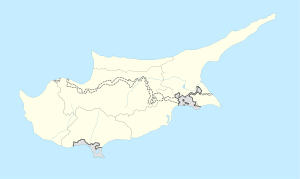Patriki
| Patriki | |
|---|---|
| Πατρίκι (Greek) Tuzluca (Turkish) | |
| Location in Cyprus | |
| Coordinates: 35°21′47″N 33°59′46″E / 35.36306°N 33.99611°ECoordinates: 35°21′47″N 33°59′46″E / 35.36306°N 33.99611°E | |
| Country |
|
| • District | Famagusta District |
| Country (controlled by) |
|
| • District | İskele District |
| Time zone | EET (UTC+2) |
| • Summer (DST) | EEST (UTC+3) |
Patriki (Greek: Πατρίκι, Turkish: Tuzluca) is a village in the Famagusta District of Cyprus, located on the Karpas Peninsula. It is under the de facto control of Northern Cyprus.
Patriki is the ancestral home of singer George Michael (Georgios Kyriacos Panayiotou). His father, Kyriacos Panayiotou, was born here in 1935 and lived in the village working with family until 1953 when he left for England.
The village has been under Turkish occupation since the 1974 invasion. The village used to be inhabited by Greek-Cypriots. In his book Historic Cyprus (second edition 1947) Rupert Gunnis (who was Inspector of Antiquities on the island at the time) wrote:
"The principal church of the village dedicated to the Archangel Michael is without interest. Near by lies a small Chapel of St. George, with a few fragments of early woodwork built into the miserable iconostasis, which is otherwise formed of boards from packing-cases. The poor and late seventeenth-century holy doorsfrom some destroyed church are kept in a coffee-shop.
"One of the most curious local customs still remaining in the island is practised every Easter Monday i this village; all the married persons gather into the churchyard, and the men, without taking off their coats, have to crawl through a hole in a large stone which stands here. If the man is unable to crawl through this stone it means that his wife is unfaithful to him, for it shows that he has antlers which prevent him from passing through. In 1935 only one man stuck, and he, on his return home, beat his wife and has since started divorce proceedings, the fact that he was unable to pass through the stone being considered by him and his co-villagers as ample evidence."
...
Wikipedia

